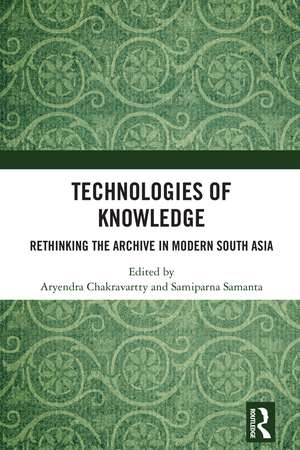Technologies of Knowledge: Rethinking the Archive in Modern South Asia
Editat de Aryendra Chakravartty, Samiparna Samantaen Limba Engleză Hardback – 24 sep 2024
Unraveling technology as an indicator of South Asia’s encounter with modernity, the chapters in the volume interrogate how technology was witnessed in the production of culture, historicizing and preserving the past, and establishing claims to heritage and history. In addition to examining the critical role of creative and commercial networks in establishing communities, the volume also scans the significant contribution of technology as a mechanism of social control. It highlights the pervasive nature of discourse that continues to assert its legitimacy, despite significant challenges to its structures of dominance, be it in the case of Bengali women or imperial dreams of curating a rapidly eroding past. In doing so, the volume emphasizes the discursive thoughts and practices that permeate the functioning of an empire and a postcolonial nation-state through narratives of resilience, appropriation, silences, and dissent.
This volume will be of great interest to scholars and researchers of science and technology studies, digital humanities, South Asian studies, modern history, colonialism, and post-independence India.
Preț: 998.40 lei
Preț vechi: 1217.56 lei
-18% Nou
Puncte Express: 1498
Preț estimativ în valută:
191.05€ • 204.29$ • 159.29£
191.05€ • 204.29$ • 159.29£
Carte tipărită la comandă
Livrare economică 17 aprilie-01 mai
Preluare comenzi: 021 569.72.76
Specificații
ISBN-13: 9780367366292
ISBN-10: 0367366290
Pagini: 156
Dimensiuni: 156 x 234 mm
Greutate: 0.4 kg
Ediția:1
Editura: Taylor & Francis
Colecția Routledge India
Locul publicării:Oxford, United Kingdom
ISBN-10: 0367366290
Pagini: 156
Dimensiuni: 156 x 234 mm
Greutate: 0.4 kg
Ediția:1
Editura: Taylor & Francis
Colecția Routledge India
Locul publicării:Oxford, United Kingdom
Public țintă
PostgraduateCuprins
Introduction: Understanding and Representing Colonial India
1. The Making of a City: Impetuosity and Interpolations
2. From Purity to Hygiene: Bhadralok Domesticity and the Restructuring of Bengali Household
3. Knowledge Technology Contested: Cholera, Commerce, and Quarantine in Nineteenth-Century India
4. Preparing the "Veterinary Baboo": The Pupils and Pedagogy at Bengal Veterinary College, 1893–1920
5. The White Man As A Burden on History: A Centre Of Oriental Culture, 1942- 1947
6. Alternative Technologies: A Different Road to Development
1. The Making of a City: Impetuosity and Interpolations
2. From Purity to Hygiene: Bhadralok Domesticity and the Restructuring of Bengali Household
3. Knowledge Technology Contested: Cholera, Commerce, and Quarantine in Nineteenth-Century India
4. Preparing the "Veterinary Baboo": The Pupils and Pedagogy at Bengal Veterinary College, 1893–1920
5. The White Man As A Burden on History: A Centre Of Oriental Culture, 1942- 1947
6. Alternative Technologies: A Different Road to Development
Notă biografică
Aryendra Chakravartty is Associate Professor of History at Stephen F. Austin State University, where he teaches courses on World History, South Asia, and British Empire. His research interest focuses on identity and belonging, and regionalism and nationalism in modern South Asia. He has published in multiple academic journals, including Modern Asian Studies, Indian Economic and Social History Review, and Indian Historical Review. He is currently completing his book Region in the Making of a Nation: Bihar in Colonial India.
Samiparna Samanta is Professor of History at Jindal Global Law School, O.P. Jindal Global University (JGU), India. She teaches courses on global histories, British Empire, modern South Asia, and social history of law. Her research focuses on history of science, medicine, and colonialism primarily in the context of Bengal. In her recent book, Meat, Mercy, and Morality: Animals and Humanitarianism in Colonial Bengal 1850–1920 (2021) she disentangles complex discourses around humanitarianism to explore the nexus between race, class, and species in the history of colonial India. Her current book project investigates the many lives of the dead to write a history of the anatomical and spectral body in British India.
Samiparna Samanta is Professor of History at Jindal Global Law School, O.P. Jindal Global University (JGU), India. She teaches courses on global histories, British Empire, modern South Asia, and social history of law. Her research focuses on history of science, medicine, and colonialism primarily in the context of Bengal. In her recent book, Meat, Mercy, and Morality: Animals and Humanitarianism in Colonial Bengal 1850–1920 (2021) she disentangles complex discourses around humanitarianism to explore the nexus between race, class, and species in the history of colonial India. Her current book project investigates the many lives of the dead to write a history of the anatomical and spectral body in British India.
Descriere
This book traces the role of technology in shaping, curating, disseminating and archiving knowledge and life in South Asia. It focuses on empirical studies of transformative social processes unleashed by technological intervention in colonial and postcolonial contexts.
